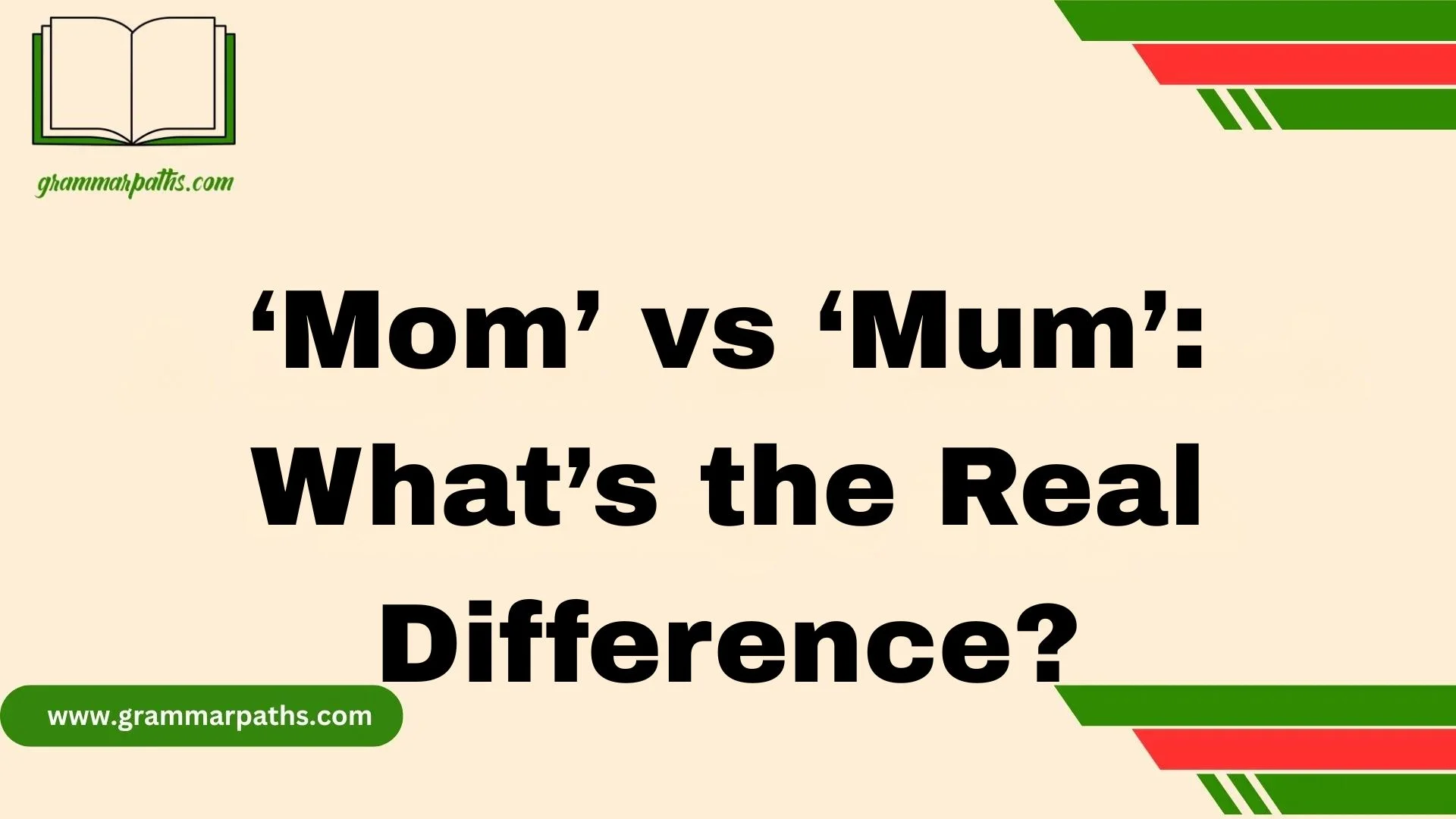For many Americans, the word “Mom” brings a warm, comforting presence—it’s tied to lunches, kisses, scraped knees, and heartfelt problems. In contrast, people in the UK think of “Mum” with equal love, but the memories differ—tea time, school uniforms, and rainy-day walks. The image is equally familiar, yet the small details subtly reflect culture. These labels, though phonetically distinct, serve the same purpose—to name the woman who raised you with care. It’s fascinating how something so tiny in sound creates a big impact in identity. That’s the heart of ‘Mom’ vs ‘Mum’: What’s the Real Difference?
Media and entertainment deepen this divide, reinforcing identities shaped by region. In American sitcoms, “Mom” often has a certain flair—a mix of organized chaos, a dash of sarcasm, and a lot of hugs. Meanwhile, British dramas depict “Mum” as quiet yet strong, reserved but endlessly loving. Over time, these portrayals have carved distinct archetypes into the public imagination. It’s more than just language—it’s an emotional, even visual vocabulary, passed on across generations, shaping the way we feel and speak about the people who shaped us.
The Real Difference Between ‘Mom’ and ‘Mum’
The main difference? It’s about where you live.
- “Mom” is used in the United States.
- “Mum” is used in the United Kingdom, Australia, New Zealand, Ireland, and other Commonwealth countries.
Both words are correct. They’re just regional variations of the same word. The difference is cultural, not grammatical.
| Word | Region Used | Pronunciation | Meaning |
| Mom | USA, Canada | /mɑːm/ (sounds like “mahm”) | Mother |
| Mum | UK, Australia, New Zealand, Ireland | /mʌm/ (sounds like “muhm”) | Mother |
Where Did ‘Mom’ and ‘Mum’ Come From?
Let’s go back a few centuries.
Both “Mom” and “Mum” can trace their roots to baby talk, where young children naturally start making “ma” sounds early in speech development. Words like “mamma,” “mam,” “ma,” and “mummy” were all early terms for mother.
- In Old English, “modor” was used for mother.
- In Latin, the word was “mater,” which influenced many modern European languages.
- Over time, the word evolved through child-directed speech—kids simplifying “mamma” into more casual words like “ma,” “mum,” or “mom.”
So, in essence:
“Mom” and “Mum” both came from early child speech, evolving regionally over time.
How the US Came to Love ‘Mom’
In America, “Mom” became the standard by the early 20th century. It was likely a blend of the British “mam” and the influence of simplified spelling movements in the United States.
American culture, especially after the rise of mass media, began using “Mom” in:
- Literature
- Films
- Advertisements
- Schoolbooks
- Mother’s Day cards
Quick Fact:
The word “Mom” is now so American that it’s often used in marketing as a symbol of comfort, family, and wholesomeness.
Why the UK Sticks with ‘Mum’
Across the pond in the United Kingdom, “Mum” is far more common. This version likely evolved from the Welsh and Northern English dialect word “Mam”, which later softened into “Mum.”
You’ll hear “Mum” in:
- British schoolchildren’s everyday language
- TV shows like Peppa Pig and EastEnders
- British pop culture and parenting blogs
British English speakers tend to feel that “Mum” sounds more warm, local, and familiar. It’s the norm in the UK, Australia, and other Commonwealth nations.
How People Say ‘Mom’ or ‘Mum’ Around the World
Here’s a look at which countries prefer which word:
| Country | Preferred Word |
| United States | Mom |
| Canada | Mom (mostly) |
| United Kingdom | Mum |
| Australia | Mum |
| New Zealand | Mum |
| Ireland | Mum or Mam |
| India | Mom or Mummy |
| South Africa | Mum |
| Philippines | Mom (often) |
How It Sounds: Pronunciation Matters
You might not notice the difference in writing, but spoken English reveals it:
- “Mom” uses a longer “ah” sound, like /mɑːm/.
- “Mum” has a short, blunt “uh” sound, like /mʌm/.
Though small, this difference helps identify someone’s accent or nationality.
How Pop Culture Shapes Usage
The way we use “Mom” and “Mum” isn’t just about where we live—it’s about what we watch and listen to.
In the US:
- Shows like The Simpsons, Modern Family, and Gilmore Girls use “Mom.”
- Music lyrics often reference “Momma” or “My mom.”
In the UK:
- Shows like Peppa Pig, The Inbetweeners, and Doctor Who say “Mum.”
- British films and ads rarely say “Mom”—it’s considered “too American.”
Quote from linguist David Crystal:
“Media doesn’t just reflect language; it reinforces it. When kids watch more of one type, they’re more likely to adopt that version.”
Children’s Literature & Its Role in Language
Books shape how young readers understand the world—including what they call their parents.
- American children’s books like Are You My Mother? use “Mom.”
- British books like Harry Potter feature “Mum,” even in dialogue.
Case Study: Peppa Pig
- British export Peppa Pig is popular worldwide.
- In the US, kids watching the show start saying “Mummy” or “Mum,” even if their parents say “Mom.”
This shows how globalization is blending regional language choices.
Do Age and Generation Affect the Choice?
Yes. Language trends evolve with generations.
- Gen Z and Millennials are more globally connected.
- Some younger Americans are now familiar with “Mum” through media.
- But in everyday conversation, “Mom” is still king in the US.
Survey Results (YouGov Poll, 2023):
| Age Group | US Preference | UK Preference |
| 15–25 | 89% Mom | 94% Mum |
| 26–35 | 93% Mom | 96% Mum |
| 36–45 | 95% Mom | 97% Mum |
Globalization & Online Influence
Social media, gaming, and video platforms are changing everything.
- TikTok creators from both the US and UK mix terms.
- YouTube influencers may use “Mum” when performing skits or impersonations—even if they’re American.
- Instagram captions and memes often feature hashtags like #MomLife and #MumGoals.
Fun Fact:
Hashtag #MomLife has over 25 million posts.
Hashtag #MumLife has over 5 million—but is growing fast due to UK and Aussie users.
Emotional Weight of the Words
Though the meanings are the same, the emotional vibe of “Mom” vs “Mum” can feel different:
- “Mom” sounds warm and nurturing in American media.
- “Mum” can sound cozy and personal to Brits.
- Words like “Mommy,” “Mummy,” or “Mama” are used more by small children or in affectionate speech.
Linguists note that maternal words carry strong emotional resonance, so regional preference is often tied to identity and upbringing.
When Should You Use ‘Mom’ or ‘Mum’?
If you’re writing or speaking to a US audience, always use “Mom.”
If your audience is British or from Commonwealth countries, go with “Mum.”
Tips for Writers and Brands:
- Know your audience’s location.
- Match your word to their dialect.
- When in doubt, use “mother” (formal) or rewrite to avoid it.
Common Idioms with ‘Mom’ and ‘Mum’
Language is rich with phrases and idioms using these terms:
| Idiom | Meaning | Region |
| Mum’s the word | Keep it secret | UK/US |
| Like mom used to make | Traditional, nostalgic cooking | US |
| Mom jeans | High-waisted jeans from the 90s | US |
| Mum guilt | Guilt mothers feel over parenting choices | UK |
Idioms reflect culture, which is why regional differences show up even in slang.
Slang and Variations Around the World
There are many ways to say “Mom” or “Mum” depending on the country or region.
| Word | Used In | Notes |
| Mom | USA, Canada | Most common in America |
| Mum | UK, Australia, NZ, Ireland | British standard |
| Mama | Southern US, Philippines | Informal or affectionate |
| Mummy | UK, India | Common with young children |
| Mam | Ireland, Northern England | Regional variation |
| Ma | Rural US, informal speech | Often used in poetry or songs |
| Ma Dukes | African American slang | Urban slang, affectionate tone |
Conclusion
Whether you say “Mom” or “Mum,” you’re expressing the same deep love, connection, and respect for the woman who shaped your world. These small linguistic differences don’t divide us—they reflect the beauty of culture, language, and how our childhood, memories, and even entertainment help form emotional bonds through words.
As we move through a globalized world where the US, UK, and other regions share stories and experiences, the choice between “Mom” and “Mum” becomes more than just spelling—it’s a reminder of how language holds both our identity and our affection.
FAQs
Q1: Is “Mom” wrong if I’m speaking British English?
Not wrong, but “Mum” is the standard in the UK and other Commonwealth countries. It’s all about regional usage and dialect.
Q2: Why do Americans say “Mom” and Brits say “Mum”?
It comes down to historical language development, phonetic shifts, and how English evolved differently in the United States and United Kingdom.
Q3: Are “Mom” and “Mum” used the same way emotionally?
Yes, both terms express the same emotional warmth, love, and respect for one’s mother—they’re just spoken differently depending on where you’re from.
Q4: Can media and culture influence which term people use?
Absolutely. Sitcoms, dramas, and even social media content shape how terms like “Mom” or “Mum” are perceived and used globally.
Q5: Should I use “Mom” or “Mum” when writing formally?
Use the version that matches your audience’s region. For global clarity, sometimes writers use both: “Mom (Mum)” to include everyone.
Resources and References
- Merriam-Webster Dictionary – Mom vs Mum
- BBC – Why British English is Staying Strong
- YouGov Language Survey, 2023
- Oxford English Dictionary

Grace Marie is the dedicated writer behind GrammarPaths.com, where she shares her passion for English grammar, idioms, and writing mastery. With a strong background in language studies and years of experience helping learners improve their communication skills, Grace creates clear, practical, and engaging content that makes English easy to understand.












